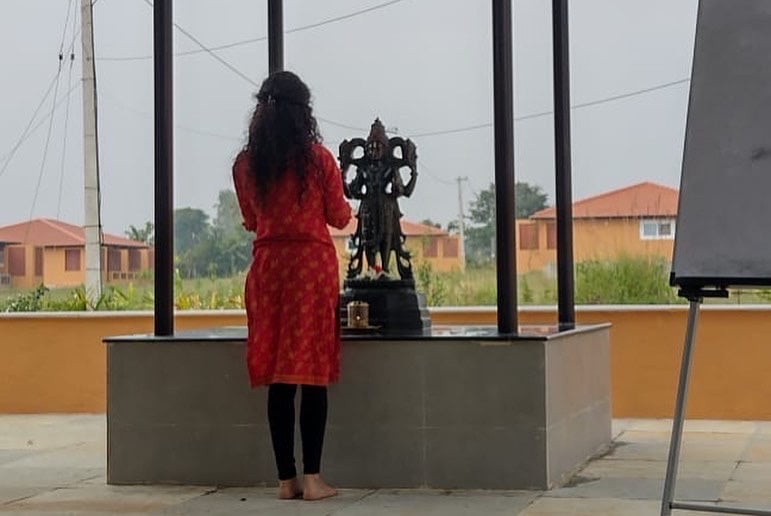Reclaiming Forgotten Timelines: Ancient Wisdom for a Sustainable Future
In our pursuit of progress, have we left behind the very wisdom that could guide us forward? This blog explores overlooked timelines from ancient Bharat and other civilizations, reconnecting them with today’s pressing issues which are sustainability, consciousness, and collective well-being. Through reflections on Yoga, nature, discernment, and inner transformation, it invites readers to reawaken forgotten knowledge systems that are deeply relevant to our shared future.
ANCIENT WISDOMHARMONY WITH NATURE
Devika Kumari
6/26/20253 min read


Introduction
What if the root of today’s global crises is not merely industrialisation or climate change, but the quiet erasure of ancient ways of knowing? What if the very timelines we consider "primitive" held the keys to true sustainability, resilience, and harmony with the Earth? This isn't about nostalgia. It's about reclaiming wisdom that was silenced, dismissed, or deemed irrelevant in the linear march of so-called progress.
In the last few centuries, dominant historical narratives have largely ignored or flattened the richness of non-Western civilizations. Bharat (India), along with many indigenous cultures, possessed vast knowledge systems that seamlessly blended spirituality, ecology, medicine, mathematics, architecture, and ethics. Today, as we stumble through environmental, emotional, and societal breakdowns, the forgotten timelines beckon us. Not with dogma, but with invitation.
The Cost of Ignored Civilizations
When we imagine humanity's past, we are often shown a progression from "savage" to "civilised", from caves to cities, from myth to science. This linear framing benefits certain power structures but ignores cyclical, interconnected worldviews that flourished in ancient Bharat, among many other ancient civilisations. Their timelines were not primitive, but deeply sophisticated in ways modern systems are only beginning to understand.
This erasure is not just academic. It impacts our global priorities. What we value. What we teach. What we fund. And most crucially, what kind of future we envision. By ignoring ancient knowledge systems, we forfeit the tools of inner discernment, collective wisdom, and sustainability rooted not in profit, but in harmony.
Bharat's Knowledge Systems: A Universal Offering
The Indian Knowledge Systems (IKS) are not meant to be exotic, exclusive, or only of cultural pride. They are immensely practical. Systems like Ayurveda, Yoga, Vaastu, classical arts, and even ancient linguistics (Panini's grammar, for example) are not only relevant to Indians but to the world at large.
These are not cultural artifacts. They are technologies of consciousness.
Samvaad (dialogue), as practiced in ancient Bharat, allowed diverse worldviews to sit in conversation, without needing to cancel each other. It was not debate to win, but dialogue to understand. Imagine how this principle could transform social media, education, and political systems today.
Reclaiming Pramana and Viveka Buddhi
In today’s world of misinformation and hyperstimulus, we have more access to knowledge than ever before, and yet, less clarity. Ancient Bharatiya systems emphasized Pramana (means of valid knowledge), training the mind to discern what is true, what is assumption, what is inference. This wasn’t just philosophical. It was foundational.
Viveka Buddhi, the intellect's power to discern, was seen as essential for students, kings, and seekers alike. A child in the Gurukul system wasn't just taught arithmetic or scriptures. They were taught how to think. How to recognize mental fluctuations (vrittis), not just obey rules. How to ask, who is the observer behind the mind?
Today, we give degrees. But do we cultivate discernment?
Imagine if school children were taught not just what to believe, but how to arrive at belief through direct experience, reason, and deep listening. Imagine if a part of every curriculum focused on building inner stillness, so that external knowledge had fertile ground to root.
The Role of Science and Mystery
Even in modern forensics and science, there is a growing openness to intuitive hunches, gut intelligence, and energy-based systems. Ancient systems acknowledged this. They honored both the seen (Pratyaksha) and the unseen (Anumana, Upamana, Agama) as valid ways of knowing.
And unlike the binary of science vs faith, they saw reality as layered. Like peeling back the sheaths (Koshas) of the human experience, from the physical to the bliss body.
We need both: data and direct perception, logic and stillness, analysis and alignment.
Inner Work as Outer Revolution
The most radical change doesn’t begin in systems. It begins in the self. Because systems are extensions of our collective inner states. A fragmented, reactive society mirrors the inner fragmentation of individuals who haven’t been taught to center themselves.
Ancient timelines remind us that revolutions need not always be loud. They can also be soft. They can look like someone choosing to meditate before responding. Like someone choosing a sustainable choice not because it's trending, but because it’s aligned with Dharma.
When we are aligned internally, we waste less. We speak with precision. We feel more, yet are not overwhelmed. We live slow but full. This is not spiritual escapism. This is ecological intelligence.
Reweaving the Fabric
Reclaiming forgotten timelines is not about going back. It’s about moving forward with memory. Memory of how civilizations flourished without colonizing, of how people lived in step with the moon, the soil, the body.
Conclusion: Listening Again
To reclaim ancient timelines is not to reject the modern. It is to heal the rupture. To realize that wisdom is not linear, and progress is not always forward. That perhaps the answers to our most modern problems lie in the roots.
Let's dream a future that remembers.
Devritti Yoga and Wellness
Embrace your journey to wellness and peace.
Contact
devrittibliss@gmail.com
© 2024. All rights reserved.


